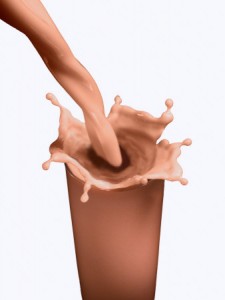Recovery Nutrition for Athletes
- At October 07, 2011
- By Katherine
- In News
 0
0
 Endurance Nutrition for Athletes
Endurance Nutrition for Athletes
With endurance training, the main goal is to provide calories for daily activity and those expended through exercise in addition to replenishing glycogen (energy) stores and repairing lean muscle mass. Focusing on eating often as well as nutrition pre-exercise, during exercise, and post-exercise is key to training and performing at an optimal level.
When your workouts are strenuous, you need protein, carbs, electrolytes and fluids to bounce back. Believe it or not, plain old Chocolate milk has that and more. Lowfat chocolate milk has 9 key nutrients, including some not typially found in sports drinks, like calcium and vitamin D to strengthen bones and reduce the risk of stress fractures, and B vitamins for energy.
According to several research studies, lowfat chocoalte milk is an effective post-workout recovery drink. Some research even suggests milk may help restore and maintain hydration better than water or certain sports drinks. It has PROTEIN to help build muscle, CARBS to refuel muscles, ELECTROLYTES to replenish what’s lost in sweat, and FLUIDS to help rehydrate the body.
During strenuous workouts, muscle tissue breaks down. It’s the rebound, the rebuilding, that has you coming back stronger next time. For that you need protein in your recovery routine.. And the kind of high quality protein found in milk is ideal.
Most sports recovery drinks add protein and nutrients, but milk is a natural source of high quality protein and nutrients, and with lowfat chocolate milk, you get the right mix of protein and carbs to refuel exhausted muscles… A high quality fuel for a high-quality recovery!
American Dietetic Association Guidelines
Meal-Planning Tips
• Eat frequent meals and snacks throughout the day, Do not skip meals, Limit alcohol intake
• Include a whole grain carbohydrate and a lean protein/healthy fat with all meals and snacks to increase satiety
• Include non-starchy vegetable and fruits with meals and snacks
• Carbohydrate intake should range from 5 g/kg to 7 g/kg for moderate-duration and low intensity training, 7 g/kg to 12 g/kg for moderate to heavy training, 10 g/kg to 12 g/kg for extreme training
o Choose whole, high-fiber grains as your carbohydrate meal choices (breads, bagels, tortillas, cereals, oatmeal, granola bars, crackers, pastas, rice, potatoes, etc.)
- Protein intake should range from 1.2 g/kg body weight to 1.7 g/kg body weight
- Choose lean proteins such as chicken or turkey without skin, lean cuts of red meat, fish, low-fat dairy, eggs, beans, tofu, edamame, or whey or soy protein powder
- Fat intake should range from 0.8 g/kg to 1.0 g/kg
- Increase intake of healthy fats (peanut butter, nuts, seeds, flaxseed, olive oil, salmon/tuna) and decrease intake of saturated fats (fried foods, baked/packaged goods, and white, thick, creamy sauces/spreads)
- Hydration should be adequate so that urine color is pale yellow throughout the day
- Rely on water throughout the day and water/sports drinks during exercise
- Consume post-exercise snack as soon as possible (within 45 minutes) after training
Foods Recommended
Pre-Exercise Eating
• Meal timing: 3-4 hours before exercise
• Meal composition: High in low-glycemic carbohydrate (200 g to 300 g) and lean protein, low in fiber and fat
• Meal hydration: Four hours before activity, consume 5 mL/kg to 7 mL/kg (2 mL/lb to 3mL/lb) or 17 oz to 20 oz water or sports drink
• Snack timing: 30 minutes to 1 hour before exercise
• Snack composition: High in carbohydrate, moderate in protein, low in fat and fiber
• Snack hydration: 5 oz to 10 oz water or sports drink
During-Exercise Eating
• Carbohydrate intake should begin shortly after the onset of activity
• Timing: Consume 30 g (1 ounce) to 60 g (2 ounces) carbohydrate/hr spaced every 15-20 minutes (30 grams/ml = 1 ounce)
• Composition: High-glycemic carbohydrate such as sports drinks/gels/blocks/beans, fruit, high-carbohydrate bars with moderate protein, crackers, etc.
• Hydration: Dependent on sweat rate
o Average: 5 oz to 10 oz water or sports drink every 15-20 minutes
o Sports drinks should contain 6% to 8% carbohydrate
o Replace electrolytes lost via sports drink or foods high in sodium/potassium
Post-Exercise Eating
• Snack timing: Within 30 minutes post-exercise
• Snack composition: 4:1 ratio of high-glycemic carbohydrate to lean protein… Ideal food/drink: Chocolate Skim Milk!
o Recommended amount: 1.0 g to 1.5 g carbohydrate/kg
• Meal timing: 2 hours after exercise (Continue meals in 2-hour intervals up to 6 hours)
• Meal composition: High in low-to moderate-glycemic carbohydrate & lean protein, low in fiber and fat
o Recommended amount: 1.0 g to 1.5 g carbohydrate/kg
• Hydration: 16 oz to 24 oz water or sports drink for every pound lost during exercise
Foods NOT Recommended
Pre-Exercise
• High-fat foods (high-fat meats, heavy sauces/creams, fried foods, buttery foods, desserts)
• High-fiber foods (cruciferous vegetables, whole grains extremely high in fiber, beans)
• Carbonated beverages, Sugary beverages, Alcohol
During Exercise
• Low-glycemic carbohydrates (high-fiber whole grains)
• High-fiber foods (cruciferous vegetables, whole grains extremely high in fiber, beans)
• High-protein foods (meats, dairy, high-protein energy bars)
• High-fat foods (high fat meats, heavy sauces/creams, fried foods, buttery foods, desserts, large quantities of nut butters, nuts, seeds)
• Fluids containing more than 8% carbohydrate (juice, soda, sweet tea, energy drinks, etc.), Alcohol
Post-Exercise
• High-fiber foods (cruciferous vegetables, whole grains extremely high in fiber, beans)
• High-fat foods (high-fat meats, heavy sauces/creams, fried foods, buttery foods, desserts, large quantities of nut butters, nuts, seeds)
• Fluids containing more than 8% carbohydrate (juice, soda, sweet tea, energy drinks, etc.), Alcohol
For more fabulous tips and simple, effective ways to lose weight,
buy her book, Diet Simple!









